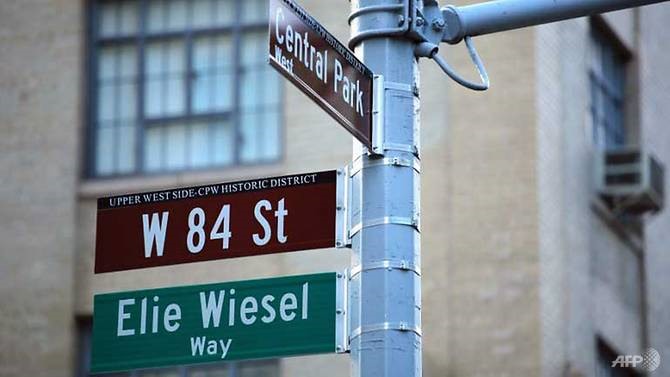 Life & Style
Life & Style

New York on Tuesday renamed a Manhattan street corner after Elie Wiesel, the Holocaust survivor, Nobel peace laureate and humanitarian who died last year. The southwest corner of 84th Street and Central Park West on the Upper West Side was permanently renamed "Elie Wiesel Way" at a ceremony attended by city officials under the baking heat of an early summer heatwave.
 |
| The street signs on the southwest corner of 84th Street and Central Park West are seen following a ceremony to permanently co-name the street with the late humanitarian and Nobel Peace Prize-winning name of Elie Wiesel in New York. — AFP Photo |
NEW YORK — New York on Tuesday renamed a Manhattan street corner after Elie Wiesel, the Holocaust survivor, Nobel peace laureate and humanitarian who died last year.
The southwest corner of 84th Street and Central Park West on the Upper West Side was permanently renamed "Elie Wiesel Way" at a ceremony attended by city officials under the baking heat of an early summer heatwave.
Wiesel, who was considered "the world’s leading spokesman on the Holocaust," is remembered for his life’s work in keeping alive the memory of the genocide of six million Jews during World War II.
"His indelible faith in humanity is an everlasting example of courage and tolerance. His words serve as a beacon of hope against fear and oppression in uncertain times," said New York Mayor Bill de Blasio.
Born in Romania, he became a US citizen and died at his home in Manhattan on July 2, 2016 at the age of 87.
In 1956, he published in Yiddish the internationally acclaimed memoir Night detailing his experiences in Nazi death camps. It has been translated into more than 30 languages and sold 10 million copies.
He won the Nobel Peace Prize in 1986. At the time of his death, then US president Barack Obama called Wiesel "one of the great moral voices of our time, and in many ways, the conscience of the world."
Arrested during the Holocaust as a teenager, his mother and younger sister were gassed at Auschwitz. His father died at Buchenwald, where Wiesel was freed by US soldiers at the age of 16.
He was reunited with his two older sisters in France, and studied at the Sorbonne university in Paris.
After he won the Nobel Prize, Wiesel and his wife founded The Elie Wiesel Foundation for Humanity with a mission to "combat indifference, intolerance and injustice through international dialogue and youth-focused programs." — AFP




